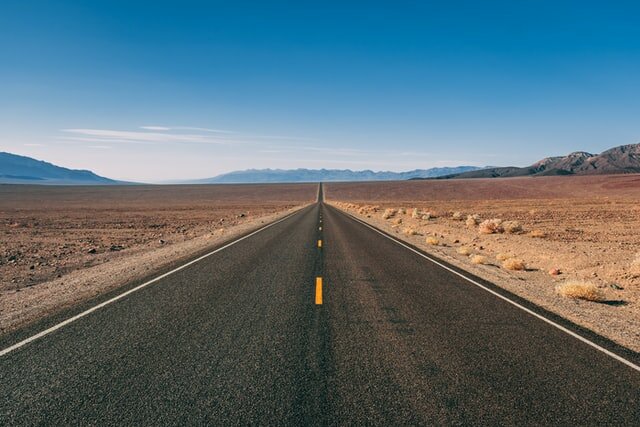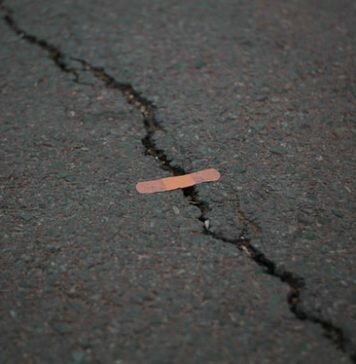We had taken a drive-away car from San Francisco to El Paso, but our final destination was San Antonio. We were two women in our early 20s; it was 1976 and we hadn’t planned the rest of the trip. We’d figure it out along the way. So after we dropped the car off at its destination, we ended up at a rest stop and I approached a couple truck drivers to see which way they were headed.
Sure, they were going the right direction the older one said, although not all the way. It was already dark and we crawled into a small space behind the front seats. On a long haul it was where the drivers took turns sleeping; one could nap while the other drove.
I’d never been in Texas before. We all know Texas is big. But west Texas felt endless that night, miles of dry dirt and scrub brush, lit up indeed by stars, just like the song promises: big and bright, deep in the heart of Texas.
Well into the night they stopped the truck and gave us a choice – and you probably know what that choice was. You probably knew what choice was coming when you heard two young women approach some truckers for a ride. And this story is no different. Put out or be put out – at the side of the road, in the middle of the night, in the rattlesnake-riddled desert, deep in the heart of Texas. We had a minute to talk it over with each other and make a quick decision, deeming the two men the lesser of the two evils.
I was the first to go in back with the older driver, his sun worn skin crinkling his face, but I wasn’t scared. He didn’t seem menacing, despite what he was doing. It was over quickly and I figured that would be that.
Then the younger driver took my friend to the back. That scared me more. She was gay and had only slept with a man two or three times in her life. I worried that he would hurt her – not just physically, but emotionally.
All through a very long night, it was mix and match, taking turns, because each man had to sample each woman and my friend and I had to be separated at all times. And the being kept apart, the isolation, was the worst of it.
The older driver took a shine to me, talking about his wife, paying me compliments, acting like I was his girlfriend.
The sex was nothing. They both had tiny dicks and it was trigger-fast, missionary-style sex. There was no AIDS to worry about in 1976 and I was at a point in my cycle that I wasn’t concerned about getting pregnant. But I didn’t know what was happening to my friend. We couldn’t communicate with each other. And the state of Texas kept growing larger, the night kept stretching longer, and I knew it would end, but I didn’t know when. I never really thought they would do something bad to us – that is, I didn’t think they would beat or kill us, as long as we were compliant. And I’d been well socialized as a female to comply, to cooperate, to get along.
The older driver took a shine to me, talking about his wife, paying me compliments, acting like I was his girlfriend. I listened quietly, not making waves. As the hours stretched on, I suggested they might drop us off at the Greyhound bus station closest to their destination. He offered to buy us tickets the rest of the way to San Antonio and I said that would be awfully nice. Had I voluntarily provided sexual favors in exchange for a ride and some tickets that probably cost less than $30? Was that what I was worth?
Only after we watched the truck’s taillights disappear did I learn that my friend’s experience had been more traumatic than mine: worse even than I’d imagined. When she was alone with the younger driver he brandished a knife. She was on her period and using a tampon. It was not removed during sex. It hurt. She was scared. Her mind floated up and out: the prairie sky is wide and high…
She was glad I’d finagled bus tickets. Hitchhiking did not feel safe. Texas did not feel safe. Being female did not feel safe.
For decades, I never said I’d been raped. Because I did, after all, have a choice. And the choice I made still is not that surprising to me. I was part of the “free love” generation, raised on the “love the one you’re with” philosophy. Of course I didn’t love the men who exploited us. But having meaningless sex with a man I wasn’t particularly into was not unknown to me. The thought of sitting by the side of the road in the desert, in the dark of night, listening to the coyotes wail, was a much bigger unknown and felt scarier.
* * *
Last year I joined a writers’ salon; six women gathered in a living room to discuss writing, nurture our creativity, and form new friendships. One of the women had recently published a memoir about her experience of having been sex trafficked from the age of 11. As she shared her journey of recovery, she revealed that it was decades before she identified a name for her experience and began to speak out about it. For years, it had been her private shame, an experience she tried to sweep under the rug.
As we talked, it turned out that four of the six of us had been raped. For one woman, rape had been her first experience of sexual intercourse, at the age of 17. A year later, when she was diagnosed with a sexually transmitted disease, she said – “But that’s not possible. I haven’t had sex.”
Although it was more than 30 years in the past, she still felt shame over the experience. She continued to ask herself why she hadn’t fought harder to prevent it. Recalling her feelings at the time she didn’t think of anger. Instead, she remembered wondering whether he thought she was fat because her jeans didn’t come off easily. She had voluntarily left a dance and accompanied this man to a motel room, and a small inner voice told her she was, therefore, at least partly responsible. Her mother had counseled her, “If a man asks you to dance, you can’t say ‘no.’ It would hurt his feelings.” It’s not such a jump for a teenager to also think she can’t say no when a man takes her to a motel room.
How was it that two-thirds of a random group of middle-aged women had experienced rape? And only one of us had, at the time, publicly called out her rapist.
* * *
I started writing this memoir from a prompt in a workshop. When I read it out loud to my small group of classmates, none of whom I knew well, the room was silent. I had been afraid my story was trivial, so far in the past; people might wonder why I was dredging up this memory. Finally the silence was broken when one woman exploded, “The fuck, Enid.” Others chimed in with support and encouragement.
One of the group members approached me afterwards and shared her story of having been raped at gunpoint and held hostage for hours. Another one, a young woman whose mother was of my generation, told me her mom felt the sexual revolution had done a disservice to women. To treat sex as casually as a handshake, to be considered “uptight” if you declined sex – were these really steps forward for women?
I don’t consider it morally wrong for people to “hook up” for sexual encounters. I oppose “slut shaming” women who embrace their sexual expression – whatever form it takes. But the issue, of course, is consent, and what constitutes consent, and who decides.
And I am deeply troubled by the insidious self-blame that so many survivors of sexual abuse and exploitation carry within themselves – a burden they may shoulder for decades, a burden that surely must warp something within them. I now count myself among these confused survivors.
It took me 40 years to write about this episode in my life, 40 years to acknowledge that it wasn’t nothing. It wasn’t some hook up that happened in an 18-wheeler. It was wrong and it wasn’t my fault, and I shouldn’t be the one to feel embarrassed. Despite all this, it has been hard for me to access the anger that others seem to expect of me, the anger I would easily feel on someone else’s behalf.
And finally, this emerged. I should not have had to make that choice. I’m angry those men saw my friend and me as easy prey. They looked at us like the dogies in the song: motherless calves with no one to protect them, forlorn creatures that can do no more than bawl and bawl and bawl.
I’m angry that women are denied agency over their own bodies in so many ways. And I’m angry that so many men don’t get it and that so many women accept it. And I’m angry that, deep in my own heart, I am still hauling the baggage of a choice I thought I’d left far behind.
Photo by Peter Mizsak on Unsplash













